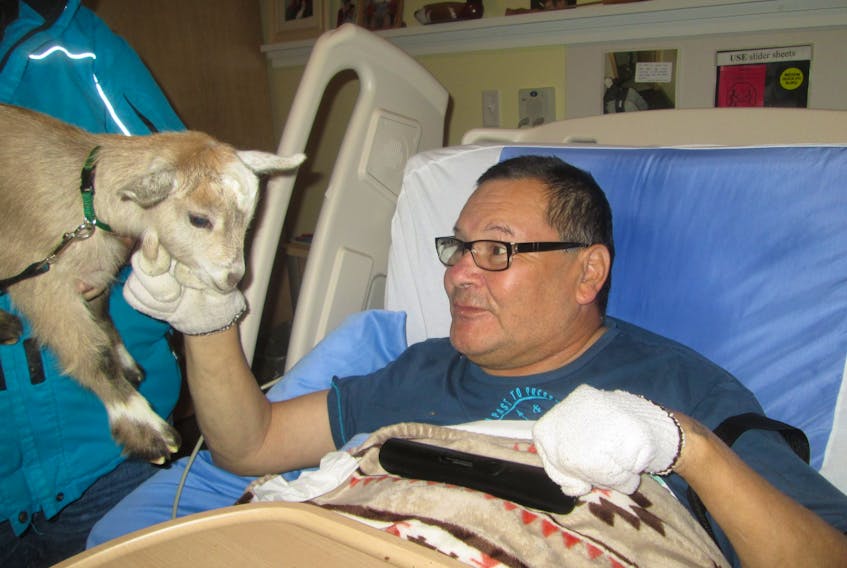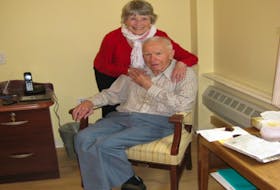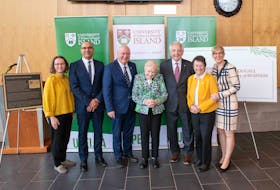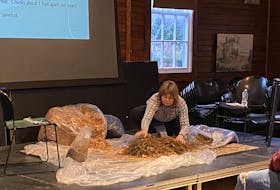The residents of the Stewart Memorial Home in Tyne Valley, P.E.I., were overjoyed at the antics of a pair of unusual – but adorable – visitors that dropped in recently.
The visitors were two Nigerian dwarf goats named Gerber and Shasta. At the time of this visit, the twin goats were all of three weeks old and little cuddly balls of energy as they jumped, played and scurried.
Devon Saila owns 20 Nigerian dwarf goats, including these two, at her farm in St. Chrysostome, P.E.I. She said many of the home’s residents, as well as the staff, are very receptive to these warm and playful creatures.
“When (the goats) are cuddled right up, you can see the peace on (the residents’) faces,” she said.
The Nigerian dwarf goat, a miniature breed of West African origin, has distinctive characteristics such as small size and colourful markings on its body. The website for Countryside Magazine points out that the Nigerian dwarf goat’s gentle and friendly personalities make for great companion pets.
The home’s residents and staff would probably agree with that assessment.
“They are awful cute little fellas,” said resident Gaile Marchbank. “They would make good pets.”
Several residents had the opportunity to pet the goats and even to have one of the goats snuggle up on their laps.
“They are well-trained and nice to have around,” said Earl Labobe, another resident of the home.
‘Wonderful, loyal, and social’

While Saila’s family has owned animals of one kind or another for as long as she can remember, as a child she was particularly fond of goats.
She recalled her father, who was a re-enactor for the Incorporated Militia of Upper Canada, taking her to Fort Henry, a national historic site in Kingston, Ont., which has a goat as its mascot. As an adult, following her purchase of a beachside property, she saw the perfect opportunity to have goats of her own.
“They need (to be) free range all summer, so they’d visit tourists on the beach,” Saila said. “It wasn’t like they were dangerous; people don’t get scared when a baby goat runs up to you.”
Saila has since expanded the herd, and has also opened up her world to the public. The goats make regular visits to Stewart Memorial Home as well as Summerset and Wedgewood Manors in Summerside, and are also available for birthday parties and other community events. As well, the farm is open to the public for several events during the summer.
“We realized how wonderful, loyal and social they are,” Saila said. “They’re like dogs; they want to please you and do things to make you happy.”
And while Saila doesn’t consider herself an expert on the therapeutic benefits of animal-human interaction, her own observation is that these goats have the ability to calm people.
“It’s like a teddy bear they can they can snuggle up with and love,” she said.
She says what’s special about animals is their lack of judgement about one’s circumstances, using the example of children from foster homes or those with special needs.
“No matter how bad a situation you’re in or how bad the kid (thinks he or she) is, they still love you, they still think you’re a great kid. There’s no judgement on their part. You love me, you snuggle me, that’s wonderful.”
Therapy horse

Mary McNevin, professor of animal science at the Atlantic Veterinary College, also understands the special power animals have in giving people peace and comfort. She’s in charge of a horse named Billy, taking him out for visits to the Provincial Palliative Care Centre in Charlottetown, P.E.I., to meet with patients and their families.
“The windows are quite low, so (the patients) see him perfectly,” she said. “He visits every patient in their window. He eats the occasional dog biscuit through the window – he’s fat as a pig.”
While weather and difficulties in arranging transportation means Billy hasn’t made it out to the palliative care unit yet this year, McNevin hopes there will be some visits this summer.
“It’s a lovely facility. There is a lot of laughter and warmth, it’s really a nice place.”
McNevin is also involved in a very unique form of therapy, certified by the Equine Assisted Growth and Learning Association. She’s part of a team which includes a certified mental health professional, herself as an equine specialist, and horses.
Clients - which include veterans, first responders and others impacted with post-traumatic stress disorder - who attend a session are in an arena with the horses, who “do their own thing” while the client observes and interacts with them, using the horses as metaphors for what is going on with their own lives.
“(The clients) can talk about what is happening if they put it in the perspective of the horse (rather than on themselves. The clients build the story),” McNevin said.
“It’s very powerful. I used to be cynical about things like this but not anymore. I’ve seen what those horses do.”
McNevin notes that, as a prey animal, horses are instinctively and intensely in tune with their environment, so they are able to pick up ‘vibes’ from the client, which helps in this kind of therapy.
Of course, while there has been research done into the effects of animal-human interaction, McNevin herself says that, in many cases, all ‘therapy’ actually means is receiving comfort and reducing stress levels, and “that’s good enough for me.”
McNevin tells a story that brings up emotions to this day. At one time, she handled therapy dogs for St. John’s Ambulance, and she recalled a visit she and the dog made with a patient who was near death. She explained that when the dog approached the patient, the patient gestured as if to pet the dog and then laughed.
“His wife said, that was the first time she heard him laugh in so long. He died later that night,” she said.
“The dog was sitting there and snuggling, but for the people, it was quite a big deal. It’s pretty amazing, I must say. It can get pretty emotional, but you feel you’re doing something worthwhile.”

RELATED:









